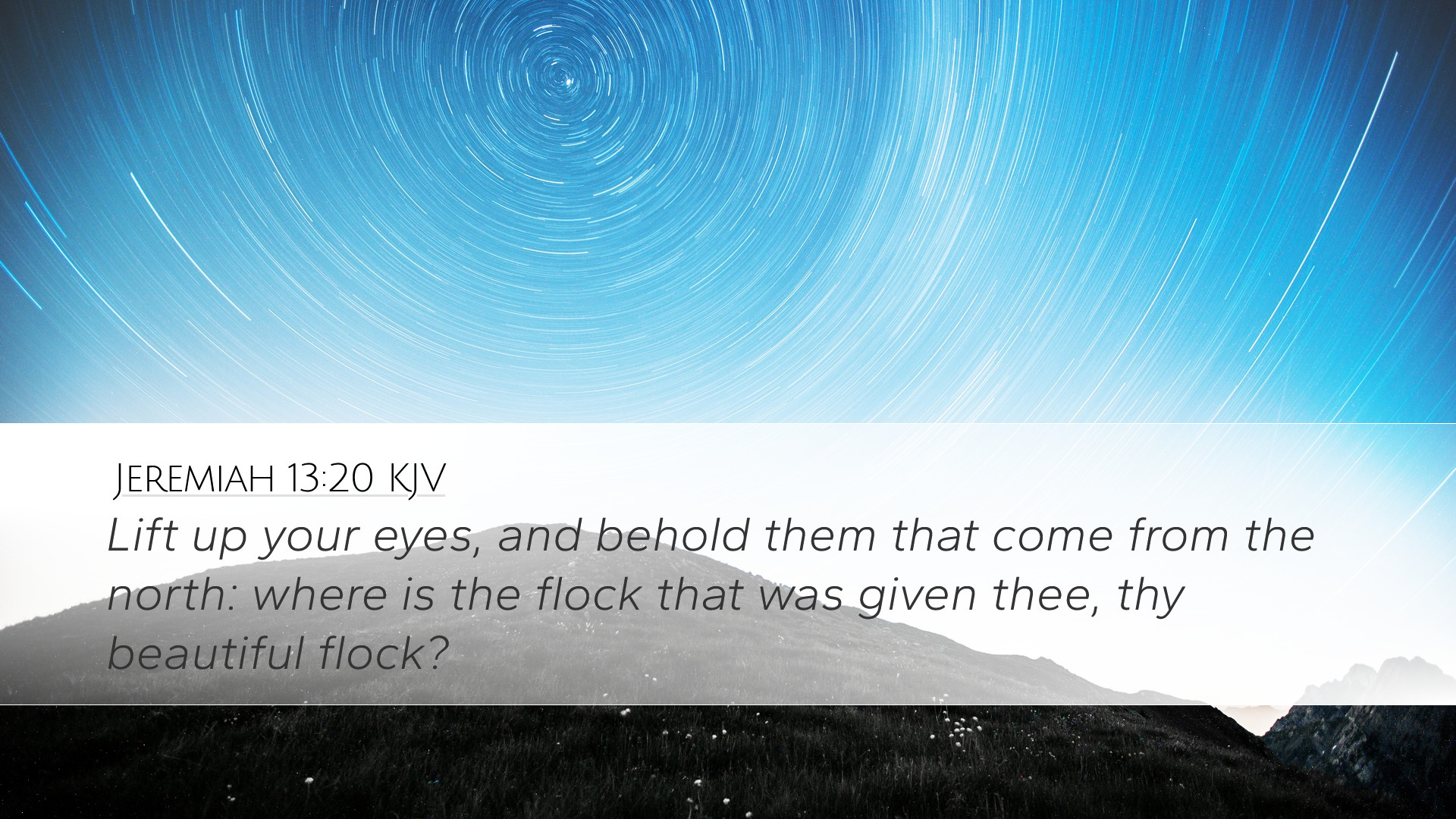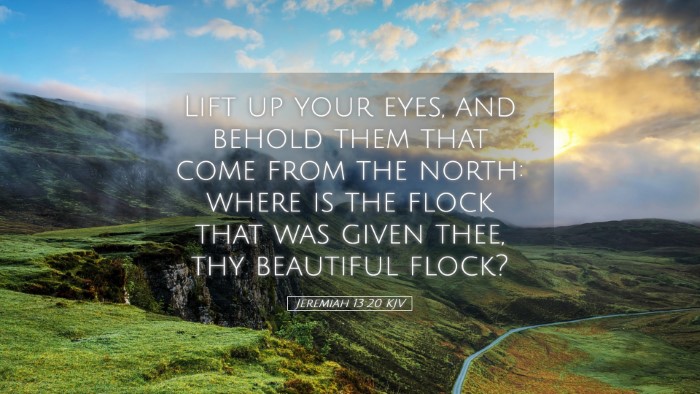Commentary on Jeremiah 13:20
Verse (Jeremiah 13:20): "Lift up your eyes, and see those who come from the north; where is the flock that was given you, your beautiful flock?"
Introduction
The verse of Jeremiah 13:20 encapsulates a powerful call for awareness and reflection, crucial in the context of prophetic ministry. This commentary draws insights from esteemed public domain sources, including Matthew Henry, Albert Barnes, and Adam Clarke, to provide a comprehensive analysis beneficial for pastors, students, theologians, and Bible scholars.
Contextual Background
Historical Setting: This verse takes place during a tumultuous period for Israel, overshadowed by impending doom and exile. The northern armies, representing destruction and judgment, are on the horizon.
Thematic Elements: The reference to the "flock" signifies not only the people of Israel but also the leadership’s responsibility toward them. The "beautiful flock" could be interpreted as a metaphor for the ideal state of Israel, reflecting the covenantal relationship between God and His people, highlighting both their beauty and fragility.
Exegesis of the Verse
“Lift up your eyes”
This phrase serves as a command, calling for a heightened awareness of reality. It suggests an urgency to recognize the gravity of the situation. Henry emphasizes that spiritual leaders must maintain vigilance to discern the threats that loom over their congregation. The expression also implies a divine invitation for repentance and acknowledgment of one’s true state.
“See those who come from the north”
The north symbolizes the impending Babylonian invasion, a significant prophetic warning that Jeremiah delivers. Barnes notes that the enemies gathering from the north represent judgment that God is bringing upon His people due to their disobedience. This geographical reference also serves as a reminder of God’s sovereignty over nations and His ultimate purpose of discipline and restoration.
“Where is the flock that was given you, your beautiful flock?”
This rhetorical question reflects heartbreak over the imminent loss of the people, who are likened to a beautiful flock. Clarke suggests that it emphasizes God's ownership and care over His people while simultaneously holding leaders accountable for their stewardship. It compels leaders to consider the condition of their “flock,” reinforcing the pastoral responsibility to guide, protect, and nurture.
Theological Insights
The tension in this verse lies between divine judgment and pastoral concern. It illustrates God’s impending judgment upon Jerusalem and the heartbreaking consequence of national disobedience. Renowned theologians like Henry expound on God’s desire for His people to return to Him, framing the call to awareness as an opportunity for repentance.
The Relationship Between God and His People: The terminology of "flock" denotes a personal relationship, highlighting God’s intimate care. This connection presents theological perspectives on the nature of God as a shepherd, a recurring theme in Scripture. It reiterates the importance of covenantal faithfulness and the implications of straying from divine commandments.
Leadership Accountability: The question posed in the latter part of the verse serves as a compelling reminder of the responsibilities of spiritual leaders. It challenges pastors and church leaders to engage in self-examination regarding their roles in guiding their communities toward faithfulness.
Practical Applications
- Awareness and Vigilance: The call to "lift up your eyes" stands as a reminder for spiritual diligence. Leaders are encouraged to remain vigilant in recognizing both societal and spiritual challenges facing their congregations.
- The Importance of Shepherding: This passage underscores the importance of pastoral care. Leaders should reflect on their commitment to nurturing their "flock," ensuring their spiritual health and wellbeing.
- Responding to God’s Call for Repentance: The urgency of recognizing the approaching judgment should move the church towards an attitude of repentance, collectively seeking restoration and reconciliation with God.
- Community Relationships: This scripture invites reflection on communal ties within the church, promoting unity and collective accountability among believers.
Conclusion
Jeremiah 13:20 acts as a dual warning and call to action. It encapsulates themes of divine judgment, pastoral responsibility, and the overarching desire for repentance. Through the lens of historical and theological analysis, this commentary provides meaningful insights for contemporary readers, encouraging critical engagement with the text and reflection on its implications for faith and practice within the community of believers.
As pastors, students, and theologians engage with this verse, may they embrace the imperative to lift their eyes, recognize impending challenges, and respond with heartfelt stewardship toward the "beautiful flock" entrusted to them by God.


